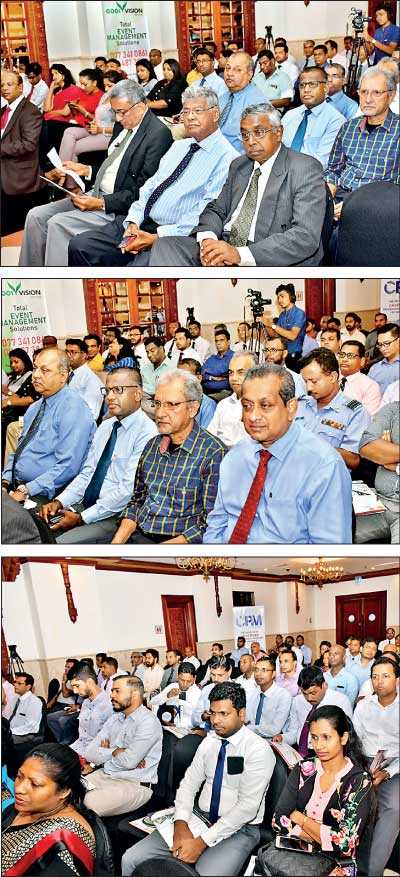Monday Feb 16, 2026
Monday Feb 16, 2026
Monday, 7 October 2019 01:08 - - {{hitsCtrl.values.hits}}
- Certain positions you cannot hold if unable to make brutal decisions, asserts Ajith Colonne
By Darshana Abayasingha
The Institute of Chartered Professional Managers of Sri Lanka held its 15th evening for managers in Colombo last week, with a presentation and discussion on ‘Rational Decision Making: Diligence of Decisions on Reasons and Facts’. The keynote at the event was delivered by Advisor on Military Intelligence to Ministry of Defence Dr. Ajith Colonne, who is also a former Trade Commissioner at the Australian High Commission, Chairman of the National Apprenticeship and Industrial Training Authority and Director of the Institute of Policy Studies.
Colonne stressed that in making rational decisions it is important to leave emotions out, however unpopular they may seem. The process for sound decision-making entails understanding the situation, defining the problem, objectives, diagnosing the problem, evaluate alternatives to choose the best alternative and then implementation.

Delivering an engaging presentation, Colonne drew from his wide-ranging experience in State, military and private machinery, sharing several anecdotes to better illustrate his reasoning. He also pointed out that rational decision-making is impacted by culture, circumstances and expectations, whereby what might seem an obvious fit somewhere would not be relevant elsewhere. Colonne remarked how in Sweden persons arriving early for forums would park furthest from the building in order to allow late comers to gain quicker access to the building. Such rationalisation does not exist in Sri Lankan culture. 
“Young people and young executives are more often very emotional, whereby their decisions and actions are 70% from the heart and 30% from the head. This usually changes the further they go in life, and I believe that rational decisions usually require a certain degree of maturity. Decisions must always bring long-term benefits, do not think only of the short-term; justify everything you do before you do it,” he added.
Drawing from his military background with parallels to the corporate world, Colonne stressed the importance of brutal decisions for situations that require decisions beyond rationality. He defined these as conscious executions of rational decisions concerning human beings employing power or authority, such as during law enforcement or when the interests of a majority need to be safeguarded. “Certain situation demands brutal decisions, so certain positions you cannot hold if you are weak and you cannot take brutal decisions,” he stressed.
However, unpopular these are, if they are thought out with purpose it will eventually turn out right for the organisations and people affected, he said. He also reminded on the importance of learning to frame communications appropriately based on the group of people it is targeting and their rank and file.
A panel discussion was held soon after the keynote which also featured Riscor Consultants Director Chris Corea, who underscored the need to take into account long-term considerations before arriving at decisions. He pointed out that executives must first identify the time that is presented to arrive at a decision, and to try obtain as much information as possible during that period from as many learned sources available. He also reminded the importance of engaging people in decision-making to administer the implementation of said projects or actions.
The Institute of Chartered Professional Managers of Sri Lanka is a professional body for managers set up with the assistance of All India Management Association (AIMA) and CMA Sri Lanka. It is also engaged in the conduct of professional management diploma programs, executive management development programs, and knowledge-sharing sessions, research forums, international management conferences, release of bi-annual management journals and organising various other networking events. CPM Sri Lanka is recognised internationally and is an active member of the Association of Management Development Institutions in South Asia (AMDISA). AMDISA includes management institutes of all the SAARC Countries.
– Pix by Indraratne Balasuriya